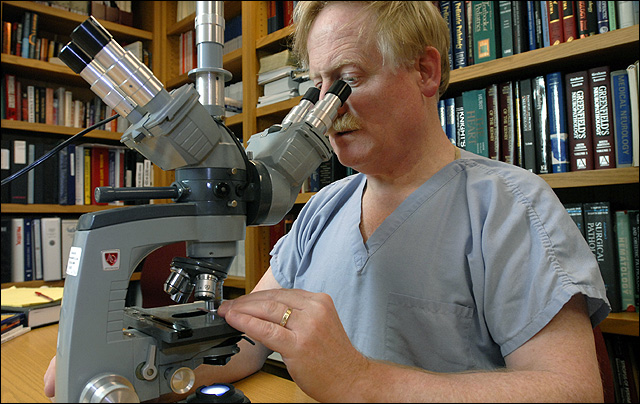Citing alleged missteps in 30-year-old New York case, defense lawyer demands coroner be barred from 2 Lawrence murder trials

photo by: Chris Conde/Journal-World
The Douglas County Judicial and Law Enforcement Center, 111 E. 11th St., is pictured Sept. 15, 2018.
Skeletons in a coroner’s closet may be coming back to haunt him — or at least to haunt prosecutors seeking justice for recent homicide victims he examined.
A lawyer for two Lawrence murder defendants is trying to bar the coroner from testifying at their upcoming trials. In newly filed motions, appointed attorney Angela Keck accuses former Douglas County coroner Erik Mitchell of “dishonesty and false statements” and asks Douglas County District Court judges to exclude his testimony from the trials of Rontarus Washington Jr. and Steven A. Drake III.
“Dr. Mitchell can not be trusted to provide reliable and accurate testimony,” Keck wrote. “The defense believes the state may be aware of even more instances of Dr. Mitchell’s lack of honesty and veracity, and possibly, misconduct.”
Keck wrote that Mitchell’s testimony as an expert for the state “has been called into question many times, so much so that his testimony can not be considered reliable.”
In her motion, she cites two.
One is a 1987 homicide in New York. The ensuing murder conviction was recently overturned by an appeals court, because the defendant’s lawyer failed to challenge Mitchell’s inconsistent autopsy findings or address his office being under investigation for misconduct at the time of the trial.
The second is a claim — yet to be ruled on by a judge — by attorneys for recently convicted Eudora murderer Carrody M. Buchhorn that Mitchell gave the jury a “junk science” theory of death for the infant victim.
Hearings expected to address Keck’s motions are scheduled this week, on Thursday and Friday.

photo by: Journal-World File
Douglas County Coroner Dr. Erik Mitchell testifies Thursday, Sept. 3, 2015, in the probable cause hearing for Rontarus Washington Jr., a Lawrence man charged with first-degree murder.
The Douglas County District Attorney’s Office has yet to file formal responses and declined to comment for this story.
“Our office will file our reply to each motion with District Court, but we cannot reply to questions before then,” Cheryl Wright Kunard, assistant to the DA, said in an email Friday.
More coverage
• Former Douglas County coroner relocates, again, Dec. 23, 2018
Wright Kunard said the DA’s office does stand by its previous response defending Mitchell’s testimony in the Buchhorn case.
Among other qualifications, the DA’s office has emphasized that Mitchell has performed more than 12,000 autopsies over his lengthy career as a forensic pathologist and served on the Kansas Child Death Review Board close to 20 years.
Keck wrote that revelations about Mitchell only recently came to her attention, through post-trial filings in the Buchhorn case, which also briefly mention the 1987 New York case.
• • •
Decades ago, prior to becoming Douglas County’s coroner in 1996, Mitchell was chief medical examiner for Onondaga County, N.Y.
A March 2015 decision by the U.S. Court of Appeals for the Second Circuit ordered a new trial for Hector Rivas, convicted in 1993 of second-degree murder for killing his former girlfriend, Valerie Hill.
According to the 50-plus page decision penned by Circuit Judge José Cabranes, which followed two decades of other courts upholding Rivas’ conviction:
In 1987, Mitchell performed the autopsy on the body of Hill, after it was found on a Monday morning in her Syracuse apartment, mostly naked and apparently strangled by the belt of her bathrobe. No one had seen or talked to Hill since Friday night.
No one was arrested until 1992, when a grand jury summoned by the new DA in town indicted Rivas.
In 1987, Mitchell said rigor mortis indicated Hill was probably killed Saturday or Sunday. But at Rivas’ trial in 1993, Mitchell revised his opinion to say she was probably killed Friday night — the only part of the weekend for which Rivas had no alibi.
In addition to saying cool temperatures could stretch the timeline of rigor mortis, Mitchell said that he’d examined “brain slides” showing decomposition to the brain. In fact, no such sectional slides with brain tissue existed, although prosecutors said Mitchell might have been referring to photo slides of Hill’s brain.
Meanwhile, the same DA prosecuting Rivas was investigating Mitchell’s office for misconduct, including alleged “improper disposal of waste and stealing and mishandling of body parts.” Health authorities also were looking into the situation. In November 1993, Mitchell agreed to resign, in part to avoid criminal prosecution by the DA’s office.
Rivas’ trial lawyer was ineffective because the lawyer didn’t challenge Mitchell’s revised time of death, nor did he attack Mitchell’s credibility on the witness stand in the midst of the misconduct investigation.
Even though the investigation had been publicized in area news, Rivas and his lawyer — perhaps because they were living in a different part of New York then — said they didn’t know about it.
“(Defense attorney Richard Calle) relied on an alibi defense when, in fact, Rivas did not have an alibi for the precise time that the prosecution claimed Rivas had murdered Hill,” Cabranes wrote. “Calle’s alibi defense amounted to no defense at all.”
Keck’s motions summarize the 1987 case as “involving Dr. Mitchell’s recanting of testimony and changing of a time of death of the victim in that case to support a prosecutor’s theory of the case, allegedly, in exchange for himself, Dr. Mitchell, to be relieved of possible charges for misconduct in his own office.”
Although that was Rivas’ claim, the appeals court did not determine whether Mitchell did anything unethical.
“Though we do not suggest that Mitchell intentionally lied on the stand or that District Attorney (William) Fitzpatrick suborned perjury, we think a reasonable juror would discredit Mitchell’s testimony upon learning that he had been subject to numerous investigations for misconduct and official malfeasance and was under investigation for potentially criminal misconduct at the very moment that he was providing testimony in the criminal trial,” according to the decision. “Any reasonable juror would almost certainly … harbor a reasonable doubt about Rivas’s guilt.”

Douglas County coroner Erik Mitchell, pictured in 2006.
When his new trial was ordered, Rivas had been imprisoned 22 years. But he never got the retrial.
Rivas died a couple months before facing the second jury, The (Syracuse) Post-Standard reported in 2016. He was 64 and his health had deteriorated rapidly over the previous year, which he’d spent in the county jail on $200,000 bail.
• • •
In Buchhorn’s case, she was convicted in July of second-degree murder for killing 9-month-old Oliver Ortiz while the baby was in her care at a Eudora home day care in 2016. She has yet to be sentenced.
Mitchell ruled Oliver’s death a homicide, caused by blunt force trauma to the head. The case hinged on when Oliver’s injury occurred and who was with him then.

photo by: Contributed
Oliver Ortiz
However, Buchhorn is asking for a new trial, saying Mitchell made up a theory of death that’s not medically possible.
Oliver had an inches-long fracture at the base of his skull, with internal bleeding surrounding it and also on his forehead. Two child neurology specialists, hired by Buchhorn’s new attorneys to review Mitchell’s findings, testified Friday that there’s no way the trauma causing the skull fracture caused Oliver’s death, because there was no visible damage to the baby’s brain.
The defense experts said they could not conclude how Oliver died.
• • •
Mitchell performed autopsies on the alleged victims in both of Keck’s pending Lawrence murder cases, declaring each death a homicide.
The Journal-World was unable to interview Mitchell about Keck’s accusations late last week.
• Now in custody nearly four years, Washington, 22, is scheduled to go on trial in March.
Justina Altamirano Mosso, 19, was found dead on Nov. 9, 2014, in the bathroom of her estranged husband’s apartment at Cedarwood Apartments, 1727 W. 24th St.

Justina “Tina” Altamirano Mosso
Mosso had been repeatedly stabbed and bludgeoned to death, Mitchell previously testified. He called the act “overkill.”
Prosecutors contend that Mosso died two days before she was found, on Nov. 7. Washington, a neighbor at Cedarwood, is charged with first-degree murder and aggravated burglary in her death.
In the Washington case, Keck is teamed with a second appointed attorney, Adam Hall.
• Drake, 21, is set for trial beginning Jan. 14.
Drake is charged with first-degree murder in the Sept. 19, 2017, killing of 26-year-old Bryce Holladay.

Bryce Holladay
Claiming self-defense, Drake admitted to police that he shot Holladay in the face at close range when Holladay refused to leave Drake’s home in the 2000 block of West 27th Terrace. Three witnesses previously testified that they all were trying to force Holladay out of the house when Drake shot him.
Mitchell previously testified that the bullet entered Holladay’s lower left cheek, destroyed his spinal column and exited the back of his head, killing him.







